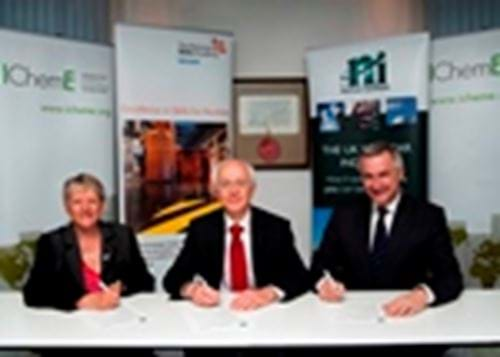New agreement will address capability and competency issues in the nuclear sector
29th April 2015

Three leading players on the nuclear skills landscape have joined forces to sign a new collaborative agreement that promotes the highest standards of professionalism across the UK’s nuclear industry.
Hinkley Point C in Somerset is on course to be the first nuclear power station in the UK since Sizewell B in Suffolk, which started generating electricity in 1995. Eleven more nuclear power stations are envisaged in a transformative development that has the potential to turn a legacy industry into one that could provide 16 GW of new nuclear capacity by 2030.
This nuclear renaissance heralds a pressing need to raise awareness of the wide range of career opportunities across the nuclear fuel cycle from apprentice to postgraduate level.
The agreement, which is supported by the Nuclear Institute (NI), the National Skills Academy Nuclear (NSAN) and the Institution of Chemical Engineers (IChemE), will facilitate closer alignment between the three organisations in a coordinated effort to encourage new entrants to the nuclear sector.
The Nuclear Energy Skills Alliance’s Workforce Assessment Model reports that the total workforce is expected to grow from 70,000 to 98,000 by 2021. Direct supply chain support for Operations, Decommissioning, Engineering Construction and Defence is forecast to require recruitment for technical roles of 3,000 and professional roles 3,500 per year for current plans to be met. The Manufacturing workforce required is also expected to grow significantly to 8,500 from 4,000 reported in 2014.
A 2014 survey completed by the Nuclear Industry Association (NIA), of more than 1,300 young people studying science, technology, engineering or maths subjects revealed that more than one third of respondents did not believe they could work in the nuclear industry. Moreover, one in seven questioned had not heard anything about career opportunities in the nuclear sector.
The new collaboration will address this knowledge gap head-on and promote the nuclear industry as an exciting career.
The collaboration has been positively received. Mr. John Clarke, CEO of the Nuclear Decommissioning Authority said: “The highest standards of nuclear professionalism are required to ensure a safe and secure nuclear future – new build, existing operations, research and development and decommissioning - for the UK.”
He went on to say: “I am delighted that NSAN, IChemE and the Nuclear Institute are formally collaborating to address this need. In particular, the development of a joint membership offer between the Nuclear Institute and IChemE is an excellent development bringing together technical disciplines and nuclear sector specific requirements. I am confident that this will have a significant impact in terms of raising and recognising nuclear professionalism across the industry.”
Professor Geoff Maitland, IChemE president, said: “Chemical engineering plays a crucial role in all parts of the nuclear fuel cycle and IChemE is fully committed to working with its partners to maximise the uptake of skills, training and professional development programmes. Britain’s nuclear future offers exciting opportunities for the next generation of chemical engineers.'
The collaborative agreement was signed ahead of the nuclear skills summit meeting in London on 29 April. The partners’ first work programme will be published later this year.